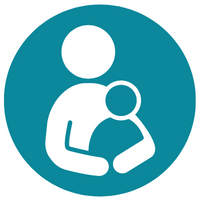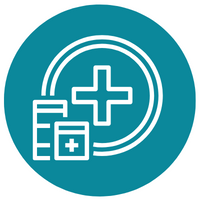
A guide for parents about how to approach eating disorder treatment
Treatment for an eating disorder is all about getting the right people on your team. Eating disorders are multi-faceted and involve both the body and mind. This means you need a team including a dietitian, therapist, and medical doctor. Also, eating disorders are highly responsive to the home environment. Thus, parents should get training and information about how to improve their child’s chances of success.
Eating disorders are self-reinforcing, which means assertive, skillful intervention is essential.
Treatment for an eating disorder is much more likely to be effective if the home environment changes alongside the child’s recovery. It will be very hard to recover into the exact same home environment in which the eating disorder blossomed.
Parent-Friendly ❤️ Neurobiology ❤️ Attachment ❤️ Non-Diet ❤️ Health At Every Size®
Because eating disorders are complex, treatment is intense and involves many factors. There are several treatment options, ranging from residential treatment to at-home, parent-led treatment. What you do depends on everything from your health insurance to your availability to take on a very active role in treatment.
The main thing to know is that eating disorder behaviors are self-reinforcing. So, the longer a person uses them, the stronger they become. Being very assertive is typically the best approach even if the eating disorder doesn’t seem too serious to you right now. Under- and poorly-treated eating disorders are incredibly persistent. Going all-in on treatment right away is usually the best approach.
Weight Restoration

Weight loss is not always a symptom of an eating disorder, but it often is. If your child is underweight for their body, they are less likely to recover from other eating disorder symptoms.
Beware of assuming that your child is not weight suppressed because they are not at the low end of the BMI scale. BMI is a population-level tool that was not designed or intended to evaluate individual health. You must look at your child’s individual growth curve. If they were born at the 80th percentile for weight and continued in that range throughout life until the eating disorder hit, and they are now in the 60th percentile, recovery will include getting back to the 80th percentile.
I know this is mind-blowing, but people at the higher end of the BMI scale are both more likely to get eating disorders and less likely to recover due to a misunderstanding of weight restoration. Significant weight suppression is serious at any size, and weight restoration is an essential part of eating disorder recovery. Your child is unlikely to recover from their other eating disorder symptoms, including negative body image, until weight restoration is achieved.
Feeding

Eating disorder recovery hinges on regularly feeding the body enough food throughout the day. This applies to all eating disorder types, because most eating disorders involve restricting food, skipping meals, and chaotic eating patterns. Eating disorder treatment, whether at home or in a facility, will include three meals and two snacks. A meal consists of all four of these components: carbohydrates, protein, fat, and veggies/fruit. A snack consists of at least two of those components.
Parents need to participate in the feeding process when a child has an active eating disorder and ideally well into recovery. Recovery is defined as actively reducing eating disorder behaviors and full weight restoration if needed. Remission is defined as no longer experiencing eating disorder symptoms on a regular, consistent basis.
Parent-Led Treatment

Parents can be primary treatment providers for a child with an eating disorder by using Family Based Treatment (FBT). In this treatment, parents take full responsibility for feeding and weight restoration. Parents can also treat their child’s anxiety, which often drives eating disorder behaviors, using a protocol called Supportive Parenting for Anxious Childhood Emotions (SPACE). Both of these approaches empower parents and teaches them the skills they need to effectively intervene in eating disorder behaviors.
Most kids will need their own treatment like therapy and consultations with a dietitian. But parent-led treatments have very strong evidence of being as effective and often more effective than other treatments.
Professional Treatment Team

Ideally your child will have a treatment team including a medical doctor, therapist, dietitian (RD), and possibly a psychiatrist. This team can work together to consult with each other and you regarding your child’s health, recovery, and treatment plan. There are three very important things to consider:
1. Specialists not generalists: You need professionals who are specifically trained in eating disorders. At the very least, your child’s therapist and RD should have training and supervision since these disorders can be badly mistreated, which can make symptoms worse.
2. Non-diet: You need professionals who operate from a non-diet perspective. It can be deeply damaging for someone with an eating disorder to be treated by someone who provides weight loss services as part of their practice.
3. Parental involvement: unless your child is over 18, you should be involved in treatment. If providers are unhelpful and/or if your child is over 18, you can still get the skills and training you need to support recovery. Get advice and guidance from your own eating disorder therapist, RD or coach. Parents are essential to eating disorder treatment and should not be left out of it!
Residential & Outpatient Treatment

Residential treatment provides 24/7 eating disorder treatment. Outpatient treatment offers daytime eating disorder treatment. Often called IOP and PHP, outpatient treatment can be used as a first-line treatment or as a step-down after residential treatment. Residential and outpatient treatment for eating disorders primarily focuses on weight restoration, eating structure, and group therapy.
Your child will hopefully stabilize their health and eating disorder symptoms. Residential and outpatient treatment can help get your child into very early recovery, however, they rarely usher your child into full eating disorder remission. Recovery work as defined above will need to continue for many months after a child has graduated from residential and/or outpatient treatment.
Avoid Partial Treatment

Eating disorders are undeniably difficult to treat. It is very common for both the person with the disorder and their parents to become fatigued and want to relax treatment adherence. This leads to partial treatment that can have long-term consequences. Eating disorders are self-reinforcing, so the longer a person has an eating disorder, the stronger it becomes.
In general parents should avoid backing off or abandoning eating disorder treatment before your child shows signs of full remission. The more skillfully and assertively you intervene in eating disorder behaviors, the better the treatment outcomes. If your child is over 18 and financially independent, you will need to use different strategies. However, at any age, even if your child is not choosing recovery right now, you can still be actively engaged and do your part of recovery.
Parent Scripts For Eating Disorder Recovery
Use these scripts:
- At the dinner table when behavior is getting out of control
- When you need to set boundaries – fast!
- After something happened so you can calmly review the triggers and events
< Return to types of eating disorders
Go to parenting eating disorders >
More About Treatment For Eating Disorders
Key Articles About Eating Disorder Treatment
free cheat sheet: Parenting A Child With An Eating Disorder
⭐ Get ready for recovery and find out how you can prepare yourself for maximum success.
⭐ Find out the essential steps and family rules you need to have in place for recovery.
⭐ Make your home recovery-ready with six simple steps that anyone can do.













